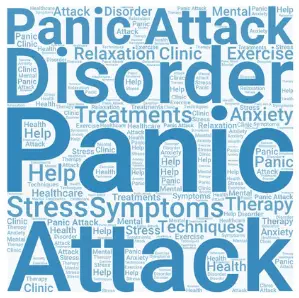Medication for panic attacks comes in different forms. Antidepressants take weeks to work, and you have to take them continuously. Benzodiazepines work quickly and provide quick relief of symptoms. They are very addictive, though, and withdrawal symptoms can be severe. This article will examine the most effective medication for panic attacks and some natural treatments. It may be surprising for you to find out which type is right for you.

The symptoms of panic disorder can be very frightening and can cause people to make drastic changes in their lives. A panic disorder occurs when you have repeated episodes of intense fear. You may feel like you are about to die, and the attacks can last as long as an hour. But, not everyone who experiences panic attacks will develop a disorder. Some people have a single attack once or twice a year. But some others experience panic attacks several times a week.
Best medication for panic attacks and anxiety
Panic attacks usually begin suddenly. Uncomfortable physical sensations, dizziness, tingling, and anxiety are some of the characteristics. To understand the difference between panic attacks and anxiety, you must know how they are different. Listed below are some common medications used for panic attacks and anxiety.
Anxiety attack medication
Medication for anxiety attacks comes in many forms. It may include over-the-counter medications, herbal remedies, or prescription drugs. There are several medications. Of these, some can interact with each other or worsen anxiety. Anxiety is often triggered by a particular action, such as feeling angry, upset, or sad. Instead of focusing on negative things, try to think about positive qualities, like your achievements. Exercising is another good way to reduce anxiety and regulate neurotransmitters. Deep breathing techniques are also helpful. Deep breathing is vital during anxiety episodes.
If you are suffering from severe panic or anxiety attacks, you may want to consider medication. Your healthcare provider will help you develop a treatment plan that will work for you. Keep track of your symptoms and sleep problems. It is important to remember that anxiety can impact many aspects of your life. So a proper diagnosis is essential. But don’t worry – you’re not alone! Many resources are available to help you manage your anxiety and find a solution.
Different Anxiety Types and their Treatments
There are many different types of anxiety disorders, and each disorder has its own set of signs or symptoms. Some people experience short-lived episodes of anxiety, while others struggle with chronic anxiety. Here are some of the most common types of anxiety disorders:
Generalized Anxiety Disorder (GAD)
People with GAD worry too much about everyday things like their health, work, family, or money. They may feel tense, nervous, and edgy and have trouble sleeping or concentrating. GAD can interfere with your daily life and make it difficult to function.
Treatment for GAD usually includes medication, therapy, or a combination of both. Medications used to treat GAD include antidepressants, anti-anxiety medications, and beta-blockers. Therapy can help you manage your anxiety and may include cognitive-behavioral treatments.
Panic Disorder
People with panic disorder experience sudden and intense episodes of fear that can come on without warning. These attacks may include a pounding heart, sweating, shortness of breath, and feelings of impending doom.
Treatment for panic disorder includes medication, therapy, or a combination of both. Medications used to treat the panic disorder include antidepressants, anti-anxiety medications, and beta-blockers.
Agoraphobia
Agoraphobia is a type of anxiety disorder that can develop after having one or more panic attacks. People with agoraphobia are afraid of places or situations where they might have a panic attack. They may avoid public places, enclosed spaces, or situations that involve crowds.
Treatment for agoraphobia may include medication, therapy, or a combination of both. Medications used to treat agoraphobia include antidepressant medications, anti-anxiety medications, and beta-blockers. Therapy can help you manage your anxiety. It may include cognitive-behavioral therapy, exposure therapy, or eye movement desensitization and reprocessing (EMDR).
Social Anxiety Disorder
People with social anxiety disorder have a fear of social situations, such as parties, meetings, or public speaking. They may worry about being embarrassed or judged by others. Social anxiety disorder can interfere with work, school, and personal relationships.
Specific Phobias
A specific phobia is an intense fear of a specific object or situation, such as heights, dogs, or flying. People with a specific phobia will go to great lengths to avoid the object or situation they are afraid of.
Treatment for a specific phobia may include medication, therapy, or a combination of both.
Selective Mutism
Selective mutism is a type of anxiety disorder that can occur in children. Children with selective mutism do not speak in certain social situations, such as school or church. They may be able to speak at home with family members.
Treatment for Anxiety Disorders
There are several effective treatments for anxiety disorders. Treatment can include medication, counseling, or a combination of both.
Medication
You can use several types of medication to treat anxiety disorders. These are antidepressants, anti-anxiety medications, and beta-blockers.
Antidepressants
Antidepressants are the most usually prescribed type of medication for anxiety disorders. They can take several weeks to start working, and some people may experience side effects, such as nausea, headaches, or weight gain.
There are many different types of antidepressants. Each person may respond in a different manner to each medication. It’s often a process of trial and error to find the one that works best for you. Some common antidepressants include:
Selective serotonin reuptake inhibitors (SSRIs): SSRIs are the most commonly prescribed type of antidepressant. They work by increasing levels of serotonin, a chemical in the brain that helps regulate mood. Examples of SSRIs include fluoxetine (Prozac), sertraline (Zoloft), and escitalopram (Lexapro).
Serotonin and norepinephrine reuptake inhibitors (SNRIs): SNRIs work like SSRIs, but they also affect the brain chemical norepinephrine. This class of antidepressants is often used to treat people with both depression and anxiety disorders. Examples of SNRIs include venlafaxine (Effexor) and duloxetine (Cymbalta).
Tricyclic antidepressants: Tricyclic antidepressants are an older class of antidepressants that are not as usually prescribed as SSRIs or SNRIs. They work by affecting the levels of several different brain chemicals, including serotonin and norepinephrine. Tricyclic antidepressants can be more likely to cause side effects than other types of antidepressants, such as dry mouth, weight gain, and drowsiness. Examples of tricyclic antidepressants include amitriptyline and imipramine.
Monoamine oxidase inhibitors (MAOIs): MAOIs are an older class of antidepressants that are not as usually prescribed as other types. They work by preventing the breakdown of certain brain chemicals, including serotonin and norepinephrine. MAOIs can have serious side effects, such as high blood pressure, so they’re usually only prescribed as a last resort. An example of an MAOI is phenelzine (Nardil).
Anti-anxiety medications
Anti-anxiety medications are also used to treat anxiety disorders. These medications can help to reduce anxiety. But they can also cause side effects, such as drowsiness, confusion, and dizziness.
Beta-blockers
Beta-blockers are sometimes used to treat anxiety disorders, especially those that are associated with performance anxiety, such as stage fright. Beta-blockers work by blocking the effects of adrenaline, which can help to reduce anxiety.
Therapy
You can use several types of therapy to treat anxiety disorders. Some of these are cognitive-behavioral therapy, exposure therapy, and relaxation techniques.
Cognitive-behavioral therapy (CBT) is a type of therapy that can help you to change the way you think about and respond to anxiety-provoking situations. CBT can be done in individual or group sessions.
Exposure therapy is a type of CBT that involves gradually exposing yourself to the situations or objects that you are afraid of. Exposure therapy can help you to overcome your fear and anxiety.
Relaxation techniques, such as progressive muscle relaxation and deep breathing, can help to reduce anxiety. Relaxation techniques can be done in individual or group sessions.
Panic attack medicines
The first step in finding relief from panic attacks is determining the underlying cause. Medications for panic attacks may include antidepressants and selective serotonin reuptake inhibitors. These drugs don’t always work right away, but they can help people deal with panic attacks over time. In addition to medication, you can try cognitive behavioral therapy to identify triggers and learn to deal with these situations. Another option is interoceptive exposure, which teaches you to become accustomed to the symptoms of a panic attack in a controlled environment. Relaxation techniques like breathing slowly and picturing a relaxing scene can help you cope with these episodes. In addition to medication, you can also try stress management techniques, such as progressive muscle relaxation, meditation, and aerobic exercise.
Although medication for panic attacks is often the first line of treatment, the goal is to decrease the frequency of these episodes and improve the quality of life for sufferers. Psychotherapy and medication are the two main treatments for panic attacks. In most cases, your physician will try other treatments before recommending medication. While therapy can help control your symptoms, it cannot address the underlying cause of your panic disorder. A combination of treatments is usually best, including therapy and medication. You and your physician can work together to find the best course of treatment for you.
Panic attack treatment without medication
In the past, many people have turned to prescription drugs to control their panic attacks. Benzodiazepine, commonly prescribed for anxiety, have been shown to help reduce panic attacks, although they can have risks for addiction. Benzodiazepines are also effective in treating anticipatory anxiety, which causes an extreme fear of something that is not realistic or rational. Some of the most popular medications for anxiety are Ativan, lorazepam, and alprazolam.
Another method of panic disorder treatment is psychotherapy, also known as talk therapy. This therapy can help you understand what triggers your panic attacks, reducing the intensity and frequency. Cognitive-behavioral therapy involves gradually reproducing panic attack symptoms, allowing the patient to know that these symptoms are not dangerous. In addition to helping a person understand their fear, cognitive-behavioral therapy teaches patients to participate in their environment.
Panic disorder medication
SSRIs (selective serotonin reuptake inhibitors) are the first line of treatment for panic disorder. SSRIs are the most common type of medication for panic disorder, and they have a low risk of serious side effects. Prozac, fluoxetine, and paroxetine are approved by the U.S. Food and Drug Administration to treat panic disorder. Other types of medications are known as SNRIs or serotonin-norepinephrine reuptake inhibitors. The FDA has approved Venlafaxine, an SNRI.
When someone suffers from panic attacks, their quality of life is reduced. They struggle with everyday tasks and social interactions and may stop doing things they used to enjoy. They may also avoid places where they feel threatened, structure their lives to avoid those triggers, and avoid going out in public. Despite these complications, overcoming panic disorder requires medication. The benefits of medicine for panic attacks are numerous. So, it is important to know when and how to seek treatment.
Drugs used to treat panic disorder.
These drugs can be broadly classified into three categories:
1) Drugs that act on the nervous system to relieve anxiety symptoms. These include benzodiazepines, beta-blockers, and buspirone.
2) Drugs that increase levels of serotonin in the brain. These include selective serotonin reuptake inhibitors (SSRIs) and serotonin-norepinephrine reuptake inhibitors (SNRIs).
3) Drugs that affect other neurotransmitters in the brain, such as norepinephrine and dopamine. These include tricyclic antidepressants (TCAs) and monoamine oxidase inhibitors (MAOIs).
What are SSRIs and SNRIs?
Serotonin and norepinephrine are two neurotransmitters that play important roles in the brain. Serotonin is a neurotransmitter that helps regulate mood, anxiety, and sleep. Norepinephrine is a neurotransmitter that helps regulate alertness and attention. SSRIs (selective serotonin reuptake inhibitors) are a class of drugs that increase levels of serotonin in the brain. SNRIs (serotonin-norepinephrine reuptake inhibitors) are a class of drugs that increase levels of both serotonin and norepinephrine in the brain.
SSRIs and SNRIs are commonly used to treat conditions such as depression, anxiety, and post-traumatic stress disorder (PTSD). They are also sometimes used to treat other conditions such as migraines, fibromyalgia, and chronic pain. SSRIs and SNRIs work by affecting the balance of neurotransmitters in the brain. This can help to improve mood and relieve symptoms of anxiety and depression.
There are a number of different SSRIs and SNRIs available, and they are all generally considered to be safe and effective. However, like all medications, they can have side effects. Some common side effects of SSRIs and SNRIs include headache, nausea, fatigue, dry mouth, and difficulty sleeping. These side effects usually go away after a few weeks. If you are considering taking an SSRI or SNRI, it is important to talk to your doctor about the potential risks and benefits.
Panic disorder is a serious condition that can significantly impact a person’s quality of life. While there is no cure, panic disorder can be effectively treated with medication. SSRIs and SNRIs are the most common type of medication used to treat panic disorder, and they have a low risk of serious side effects. If you are considering taking an SSRI or SNRI for panic disorder, it is important to talk to your doctor about the potential risks and benefits.


